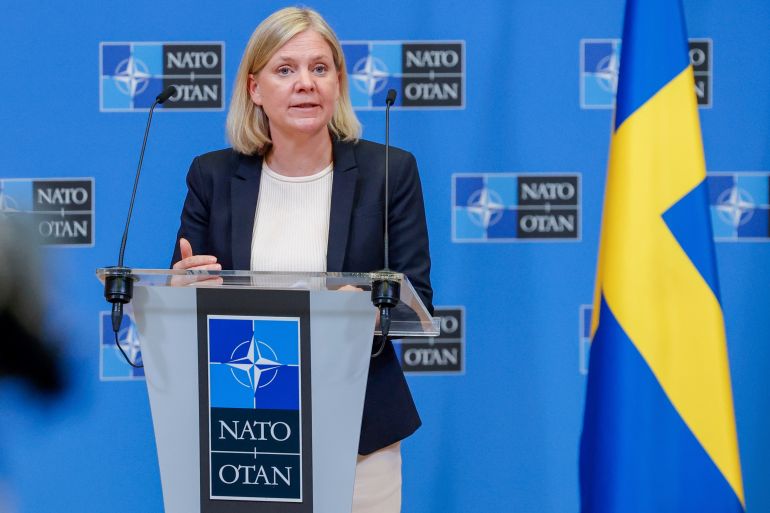NATO says Russia poses ‘direct threat’, invites Sweden, Finland
Alliance condemns Russia’s ‘appaling cruelty’ in Ukraine, vows to strengthen forces on eastern flank.

NATO leaders have called Russia the “most significant and direct threat” to the alliance’s peace and security, while officially inviting Sweden and Finland to join bloc.
The leaders of the 30-country bloc, in a joint declaration after meeting in Madrid, Spain on Wednesday, endorsed a new strategic framework and launch the largest revamp of its defence and deterrence capabilities since the end of the Cold War, strengthening its forces on its eastern flank and massively ramping up the number of troops it has at high readiness. The declaration also addressed the growing military and economic reach of China.
Keep reading
list of 3 itemsUkraine latest updates: Ukraine faces ‘brutality’, NATO head says
Erdogan agrees to NATO expansion at Madrid summit
The leaders condemned Russia’s “appalling cruelty” in the wake of its invasion of Ukraine, which began on February 24, while expressing “full solidarity with the government and the people of Ukraine” and President Vlodymyr Zelenskyy, who appealed for more modern artillery and funding from members of the bloc hours earlier.
Earlier in the day, NATO chief Jens Stoltenberg has said set high expectations for the gathering, saying it was set to be “historic and transformative” for the security alliance, which formed in 1949.
“We meet in the midst of the most serious security crisis we have faced since the second world war,” Stoltenberg said.
The rhetoric accompanied early security pledges from the United States, with President Joe Biden announcing Washington would boost its force posture in Europe, including establishing a permanent US base in Poland, two more Navy destroyers based in Rota, Spain, and two more F-35 squadrons to the United Kingdom.
British Prime Minister Boris Johnson, meanwhile, urged countries who do not hit the target alliance’s current target of spending two percent of gross domestic product on defence to “dig deep to restore deterrence and ensure defence in the decade ahead”.
Just nine of the alliance’s members currently meet that goal.
The joint declaration said NATO would “build on our newly enhanced posture, and significantly strengthen our deterrence and defence for the long term to ensure the security and defence of all allies…All these steps will substantially strengthen NATO’s deterrence and forward defences.”
The summit opened with one of the bloc’s problems solved, after Turkey agreed on Tuesday to lift its opposition to Sweden and Finland joining NATO. In response to the invasion, the two Nordic nations abandoned their long-held non-aligned status and applied to join NATO as protection against an increasingly aggressive and unpredictable Russia – which shares a long border with Finland.
On Wednesday, the NATO leaders officially invited the countries to join the bloc.
“The accession of Finland and Sweden will make them safer, NATO stronger, and the Euro-Atlantic area more secure,” the leaders said.
Speaking to Al Jazeera before the official announcement, German Foreign Minister Annalena Baerbock said the arrangement would be mutually beneficial, with the “strong democracies” and “powerful armies” of Sweden and Finland strengthening NATO.
She added plans to bolster NATO’s capability did not mean the bloc was seeking a confrontation with Russia.
“It means we are ready when we need it but when we never want to have an escalation with Russia,” she said. “All we want is to live in peace in Europe, and therefore we are making crystal clear that we are ready to defend ourselves and preparing all the structures for what we need … that if in case, we need to be there, we are there.”
For its part, the Kremlin on Wednesday decried Sweden and Finland’s ascension to the bloc as “destabilising”.
The leaders of Japan, Australia, South Korea and New Zealand were also attending the NATO summit as guests, a reflection of the growing importance of the Indo-Pacific region.
Stoltenberg said China was not NATO’s adversary, but posed “challenges to our values, to our interest and to our security”.